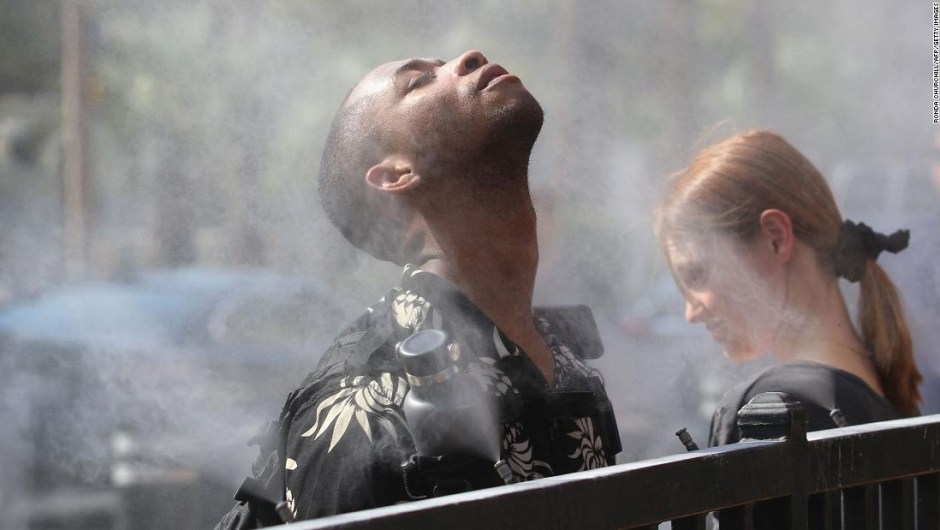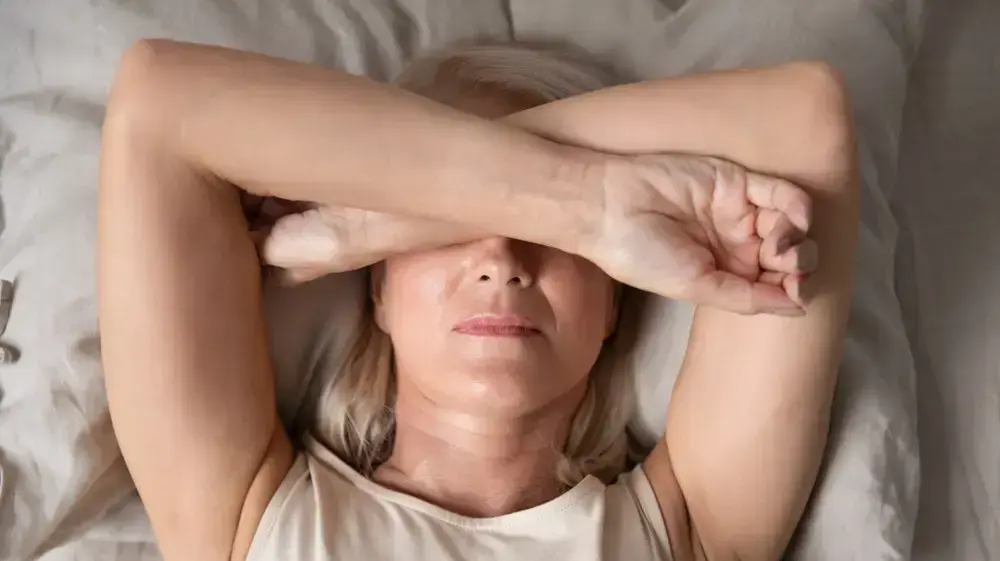(CNN) --
Here's what happens to your body in extreme heat, what to watch out for and how to stay safe.
What happens to your body?
Normally, your body is used to a certain range of temperatures, usually between 36 and 37.2 degrees Celsius.
When your brain detects a change, either lower or higher, it tries to help your body cool down or warm up, according to Dr. Judith Linden, executive vice president of the department of emergency medicine at Boston Medical Center.
"There are several different ways that (the brain) tries to cool down the body. One way, the most common way that we think of, is that you sweat," Linden said.
"The pores open, the body sweats and the sweat evaporates, which cools the body."
The second way your body cools down is by dilating your vessels and increasing your heart rate, which helps bring heat and blood to the surface of your body and helps release that excess heat.
When you're exposed to high temperatures, it becomes harder for your body to try to keep up with the cooling.
And if your environment is hot and humid, sweat doesn't evaporate as easily, further raising your body temperature, according to the Mayo Clinic.
advertising
"The higher the humidity, the lower temperatures are needed for extreme heat," Linden said.
Elevated body temperatures can lead to damage to the brain and other vital organs, according to the CDC.
They can also cause various heat-related illnesses.
Types of illnesses related to extreme heat
Mild heat-related illnesses, including heat cramps, are the most common, Linden said.
Heat
cramps
can develop in people who sweat a lot, even during exercise.
Excessive sweating uses up all of the body's salt and moisture and can lead to muscle aches or spasms, usually in the abdomen, arms, or legs, according to the CDC.
A heat rash
may also develop .
That's a skin irritation caused by sweating too much in hot, humid weather, and it's more common in young children, according to the CDC.
It's usually a red cluster of pimples or blisters, and it tends to be in places like the neck, upper chest, or elbow creases.
When your body begins to exceed its ability to cool down, it can develop what is known as
heat exhaustion.
"In this case, you're going to see excessive sweating because your body is really going to try to keep up with that extra heat. You're going to feel lightheaded, you might feel dizzy, people often get nauseous, headaches, and your skin often looks pale." and wet and your pulse is often rapid," Linden said.
"This is the body's last attempt to cool down before actually entering a point of no return."
Heat
stroke
is the most serious heat-related illness and, if left untreated, can lead to death.
"That's where your body temperature rises above 40 to 40.5 degrees Celsius or so, and that's where your mechanisms are starting to fail," Linden said.
Warning signs may include extremely high body temperatures, red and dry skin, rapid pulse, headache, dizziness, nausea or loss of consciousness, according to the CDC.
The hallmark of heat stroke is confusion and agitation, Linden said.
"So when someone is in the heat and they get confused and agitated, that's heat stroke until proven otherwise and you need to call 911 for that or get help right away and get the person out of the heat."
Who is most at risk?
The elderly, people with chronic medical conditions, and children are at higher risk for serious heat-related illness.
The elderly and people with chronic medical conditions may be less likely to feel and respond to changes in temperature and may be taking medications that worsen the effects of heat, the CDC said.
"Also very young (people), because they are less likely to recognize heat-related illnesses and less likely to get out of the heat if they start feeling overheated," Linden said.
He added that student-athletes and pets are also at higher risk.
"In this weather, you should never, ever, ever leave a child or a pet in the car for even a minute," Linden added.
How to stay safe
When your community faces extreme heat, there are several things you can do to protect yourself and others.
First, watch for symptoms of heat exhaustion or other illnesses.
"If someone starts feeling lightheaded, dizzy, nauseous or has a headache, it's time to act immediately," Linden said.
"That means getting them out of the heat and into a cool environment."
Giving someone who may be experiencing symptoms water and giving them fluids can help cool them down.
If someone begins to lose consciousness or has nausea or vomiting, call the emergency service in your country.
"If you see someone in any kind of confusion, that's an immediate red flag," Linden added.
When it's hot outside, try to avoid outdoor activities, especially between 11 a.m. and 3 p.m., according to Linden.
If you have to go out, wear light-colored clothing, cover your head, and drink plenty of fluids.
Don't wait until you're thirsty to drink water, as this can be a sign of dehydration.
Linden recommends drinking at least one glass of water, or more, per hour.
"If you start to feel lightheaded, dizzy, sweaty, have a rapid pulse, get out of the heat immediately," Linden said.
Try to find air conditioning or places in your area where you can go to stay cool, according to Ready.gov.
Even spending a few hours at a mall or public library can help.
When you're at home, fans can help, but don't rely on them as your only way to cool down;
while they may make you more comfortable, they won't help prevent heat-related illnesses.
"If you're in a very hot room, if you have a fan, is that helpful? No. I think if you have a fan and you can spray yourself ... then fans can be helpful," Linden said.
"Ventilators are not infallible."
Lastly, be sure to monitor your neighbors, parents and friends, especially older people who may be living alone or isolated, Linden said.
Heat wave







/cloudfront-eu-central-1.images.arcpublishing.com/prisa/CPCAPBNNZFHSDDUPITKV6D3I3A.jpg)
/cloudfront-eu-central-1.images.arcpublishing.com/prisa/2C5HI6YHNFHDLJSBNWHOIAS2AE.jpeg)



